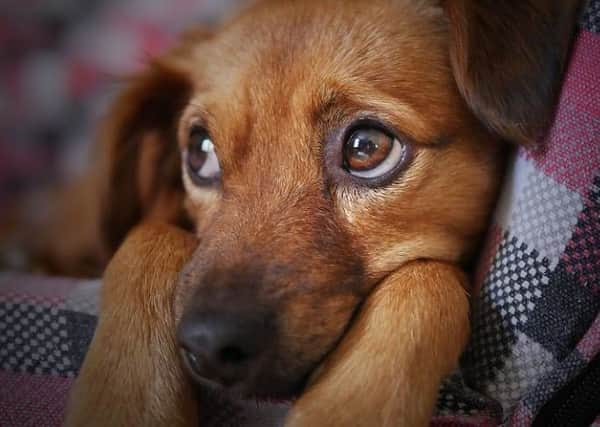Prevention is key when helping your pets cope with the stress of noisy fireworks


According to research, three quarters of pets are afraid of fireworks, with 60 per cent hiding away and nearly 1 in 10 hyperventilating when they hear loud bangs and see flashes.
With pets facing evenings filled with stress over the coming days, vets are offering advice to owners on how to best keep pets safe and calm.
Advertisement
Hide AdAdvertisement
Hide AdDr Samantha Butler-Davies, vet and clinical services manager at Vets4Pets, said, “The upcoming months are easily one of the most nerve-wracking times of year for our pets, as many experience stress induced through Halloween, Bonfire Night and even Christmas and New Year festivities.
“Bonfire Night brings with it fireworks that can reach up to 150 decibels when they go off, which is as loud as a jet engine.
“Cats, dogs and other pets have very heightened senses compared to us humans and so are incredibly sensitive to sudden loud noises and flashes in the dark.
“As smart as they are, pets just don’t understand the concept of our traditions, and so noisy fireworks are just confusing and distressing for them. They just cannot comprehend what they are or understand that they won’t hurt them.
Advertisement
Hide AdAdvertisement
Hide Ad“It is therefore understandable that the research we carried out revealed that 75 percent of pets are frightened of fireworks.
“To help keep pets calm and stress-free over the next few days, it is key that owners are able to understand the signs of distress in their pets, so they are then able to help calm them.
“Dogs often show obvious signs of distress such as shaking, panting, drooling and excessive barking, but other pets like cats show more subtle signs which can include, ears pricked forward or back, acting withdrawn or trying to hide away.
“Reports of missing pets can rise across the firework season, with our research finding that 70 percent of cat owners notice that their cat hides away from loud noises and crowds of people.
Advertisement
Hide AdAdvertisement
Hide Ad“If they are outdoors when fireworks begin and become scared, cats will often try to hide in sheds or garages and can then become stuck, or they can run away and become lost. It is therefore important that people bring their cats indoors before it gets dark and keep all doors, windows and cat flaps closed throughout the night.
“Ensuring your cat is microchipped also means that if they do become lost or stuck, there is a better chance of you being reunited with them.
“It is also useful to walk dogs before it gets dark and the fireworks begin, and to bring hutches with rabbits and guinea pigs indoors.
“If bringing the hutch inside isn’t possible, owners can provide their pet with more hay and bedding to hide and burrow away into. You can also cover the hutch with blankets to hide the bright flashes and muffle the sound of the fireworks.
Advertisement
Hide AdAdvertisement
Hide Ad“Inside the house it is vital to make the atmosphere as calm as possible. Owners can create a safe den in a secluded corner of the house and surround it with blankets and other bedding to create a safe, soundproofed place for your pet to retreat to when fireworks are going off.
“Playing music, turning up the TV and closing all curtains will also diminish the noise and flashes of the fireworks.
“One of the key things to remember is to keep calm yourself, as pets can sense fear, and to never punish your pet, even if your dog will not stop barking.
“Our research shows that 20 percent of dogs bark, yap or howl when they hear the fireworks, but scolding them will only make them much more stressed.
Advertisement
Hide AdAdvertisement
Hide Ad“Products such as thundershirts or pheromone diffusers can also help to keep pets calm, and we would recommend that owners stay in with their pets to keep them company if possible.
“If none of the above steps work at calming your pet, then you can always visit your vet for further advice or for them to prescribe medication that can help to calm your pet.
“Prevention is key and it’s important for pet owners to think about how they can reduce their pet’s stress ahead of any event that could potentially cause issues for them.
“We understand families want to enjoy Bonfire Night, so we want to encourage pet owners to follow these simple steps to help the whole household have a happy and stress-free evening.”
Tips to help your pet cope in firework season:
•Don’t react to the fireworks yourself
•Ensure your pet is microchipped
Advertisement
Hide AdAdvertisement
Hide Ad•Walk your dog earlier in the day and bring your cat, rabbit and guinea pig indoors if possible
•Shut all windows, doors and cat flaps at night
•Keep curtains and blinds closed
•Create a safe den or hiding place with familiar toys and blankets and allow your pet to hide there if they wish to do so
•Play music or turn on the TV to cover the noise of the fireworks
•Use products like a plug-in pheromone adapter or thundershirt to soothe them
Advertisement
Hide AdAdvertisement
Hide Ad•Provide rabbits and small animals with extra hay and bedding to hide in
•Ask your vet about medication if your pet suffers very badly during firework season
•For more information please visit: www.vets4pets.com/pet-health-advice/helping-your-pet-cope-with-firework-season